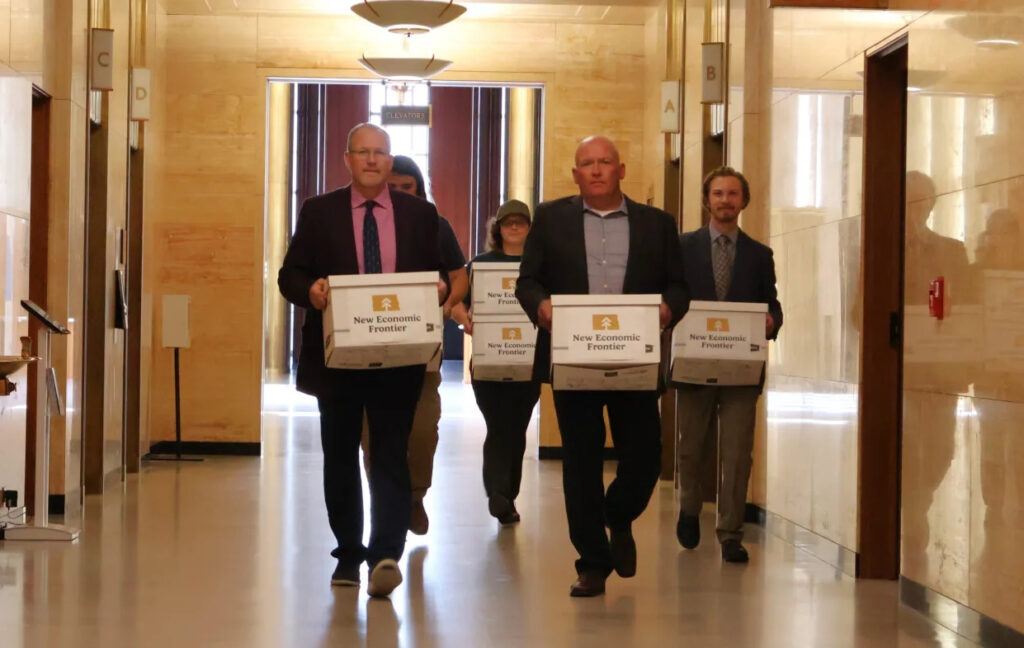Steven Bakken, left, chair of the recreational cannabis ballot initiative, brings boxes of petition signatures to the Secretary of State’s Office for verification on July 8, 2024. (Michael Achterling/North Dakota Monitor)
Sponsors of a ballot measure to legalize recreational marijuana in North Dakota submitted more than 22,000 signatures to the Secretary of State’s Office for verification on Monday.
If approved for the November ballot, it will be the third time since 2018 that North Dakota voters have considered legalizing marijuana.
“At some point, it’s going to pass,” said Steven Bakken, chair of the initiative’s sponsoring committee. Bakken said he believes the ballot measure is more conservative in nature than other cannabis measures passed in other states, which was by design.
“That’s why it’s important to have a North Dakota group putting this forward instead of a lot of language and a lot of outside influence coming into North Dakota,” Bakken said.
As a ballot initiative, the measure needs 15,582 verified signatures. A constitutional measure, including the proposal to eliminate assessed value property tax in the state, requires more than 31,000 qualified signatures.
North Dakotans opposed a similar recreational marijuana measure during the November 2018 election with 59% voting no. A second attempt at creating a recreational cannabis industry failed during the November 2022 election with 55% of voters opposed.
If the ballot initiative makes it to the November ballot and is approved by voters, North Dakotans 21 and older would be allowed to possess up to 1 ounce of cannabis flower, up to 4 grams of THC concentrate, up to 1,500 milligrams of various cannabis products and up to 300 milligrams of THC edible products.
Adults also would be able to grow up to three cannabis plants in a private residence, or on private property, generally not accessible to the public, with the blessing of the property owner.
The initiative prohibits cannabis use in all public places, indoor and outdoors. It also prohibits cannabis use while driving and while using public transit.
Cannabis manufacturing facilities and dispensaries also would be limited under the ballot measure. Across the state, seven cannabis manufacturers and 18 recreational cannabis dispensaries would be allowed under the ballot measure.
Bakken said the reason for the limit on the amount of certified cannabis businesses was to limit a free-for-all atmosphere once the program is implemented.
Businesses wishing to become one of the state’s certified cannabis businesses would need to submit various documentation about the business and pay a non-refundable $5,000 application fee to be considered. If accepted, dispensaries would need to pay a certification fee of up to $90,000 that would last for two years. Accepted manufacturing facilities would need to pay up to $110,000 for a two-year certificate.
The Legislature would be mandated to implement the state’s new recreational cannabis program by Oct. 1, 2025, which would include creating, or designating, an office or department to be responsible for the program.
Other provisions of the ballot measure would protect cannabis users in certain situations. Some of those provisions are:
Residents cannot be denied parental rights for cannabis use, unless the person presents an “unreasonable danger to a minor.”
People released from prison and those under pretrial release will not be penalized for cannabis use or other provisions of the measure.
People may not be denied eligibility for public assistance programs for using new cannabis provisions.
Gun rights may not be denied to an individual for using cannabis, or taking part in other provisions of the measure.
Penalties for people found violating the new cannabis provisions also are included in the measure. The ballot initiative also states employers retain the right to enforce zero tolerance drug policies at their businesses.
Cannabis product retailers bristle at new North Dakota rules
“I don’t partake myself and I don’t like being around it, and I don’t want to see someone walking down the street and having to smell marijuana, shouldn’t have to,” Bakken said. “But what someone wants to do in the privacy of their own home, that’s up to them.”
In 2016, voters approved a measure for the state’s medical cannabis program with nearly 64% of the vote that gave residents who qualified under a range of medical conditions the ability to acquire an ID card and purchase cannabis from medical dispensaries.
The Secretary of State’s Office will have until Aug. 12 to verify the petition signatures and announce whether the ballot measure will be approved for the November ballot.
“It gives the opportunity for voters to make a decision and allows the state to seamlessly regulate, have oversight, license and subsequently tax the cannabis in a recreational fashion,” Bakken said. “A lot of what we don’t want to see is what’s going on in some of the other states and we think that this is a measure that fits the conservative nature of North Dakota.”
Bob Wefald, a former district court judge who lives in Bismarck, voiced opposition against the previous two attempts to legalize recreational cannabis in North Dakota and said he’s ready to oppose this third try.
“It really is terrible for society,” Wefald said Monday. “There is nothing good to be had by using marijuana other than to say, ‘Well, the kids want to do it, so what the hell.’”
He added the tax money raised by cannabis sales will do nothing to offset the problems created by recreational marijuana. Wefald also said limiting dispensaries would only ensure the black market for drugs in the state will continue.
“Even if the outlet is near you, you are not going to pay for it when you can get it cheaper from someplace else, some illegal dealer,” he said.
H/T: news.yahoo.com



